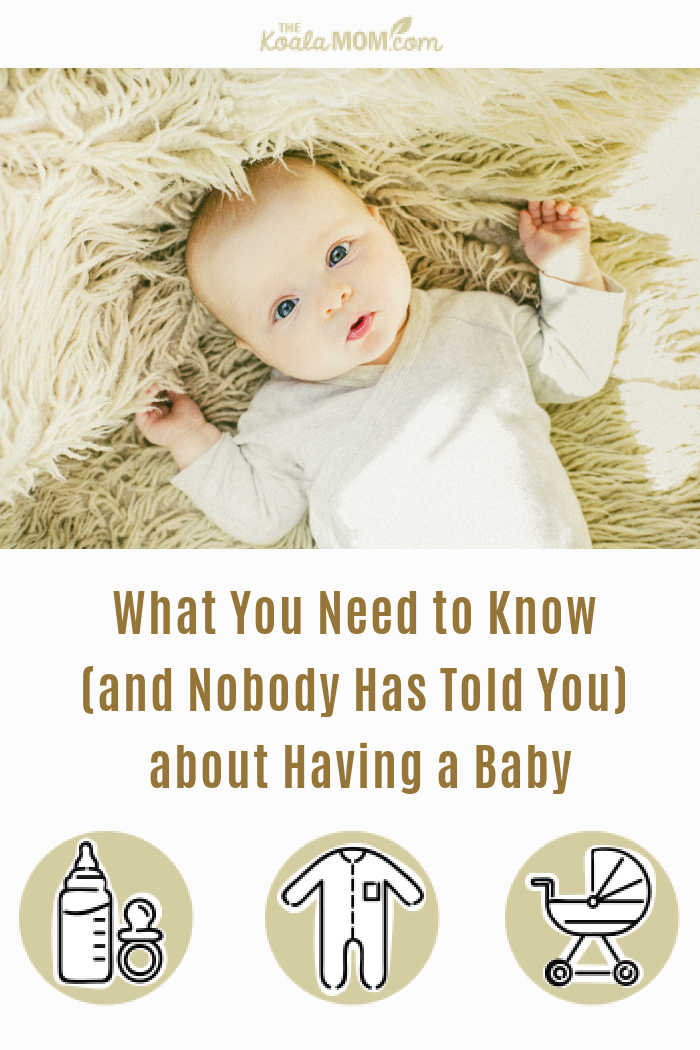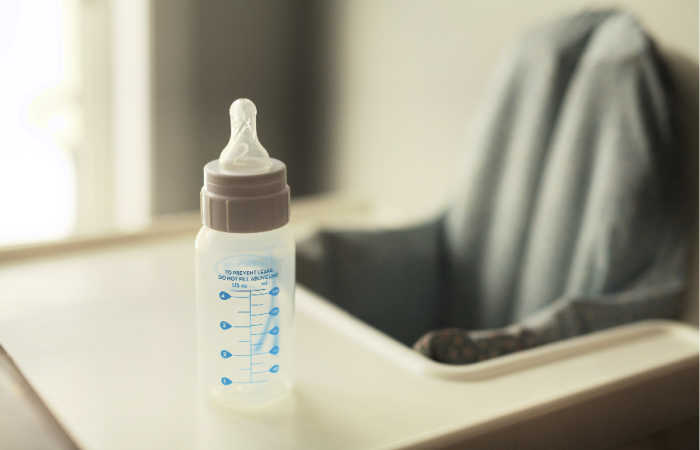Are you having a baby soon? First, CONGRATULATIONS! It’s always a precious moment when you know you’re going to be bringing a new life into the world. I’m sure you can’t wait to meet the little one you’re expecting! However, parent life is tough. I’m not trying to scare you off here, but it’s important you know some things not many people talk about. Having a baby is a wonderful experience, but it’s also hard, and you need to be prepared for what this means. If you want to know more, keep reading.

“Sleep When Baby Sleeps” is not easy
One of the pieces of advice you hear most from people is that you should try to sleep when the baby sleeps. I remember hearing this advice a lot as a new mom, and I’ve probably passed it on to other moms too.
In reality, it’s an excellent piece of advice, but it’s not always possible. Sure, sometimes you’re not going to have an issue falling asleep while your baby is resting. Sometimes you’ll fall asleep while the baby falls asleep (and your husband will wake you up later with a nudge). Often there is so much to do that you can’t settle down to sleep. You end up doing the cleaning, catching up on the loads of laundry, and you don’t get that rest you are desperate for.
Don’t worry, you’re not doing anything wrong just because you’re not sleeping at the same time as the baby.
It’s tough to get into a routine with a new baby, so don’t be too hard on yourself. Sleep when you can is the best advice. Maybe you can have a nap when the baby is napping. Maybe you need a friend or family member to watch the baby for an afternoon so you can have a nap. Maybe you need to lay down for a quick doze when your husband gets home from work.
Be creative, and work out something that works for you. Make sure you are paying attention to your own body’s needs and getting rest when you need it, but don’t stress about falling asleep as soon as baby does.
Feeding Your New Baby
The next thing that you’re probably wondering about is how often to feed your baby. Whether you are breastfeeding or using formula, your baby is going to need to be fed constantly. Before my oldest was born, I had blissful ideas of feeding her, tucking her in for her nap, and then having several hours to myself to write the next great Canadian novel. Um, that didn’t happen.

When they are newborns, babies usually feed every two to three hours. Some babies (like mine) can finish eating in fifteen or twenty minutes (just enough time for you to read a chapter or two of a favourite novel). Other babies like to nurse slowly, and take up to an hour to get their fill before napping for a couple hours and then starting to feed again.
Either way, it’s going to be a lot of feeding. You may feel trapped by this little person who needs you to constantly provide nourishment. Even if you pump or use formula, baby may not always take a bottle or accept milk from another person. Recognize that this is a stage. For now, baby needs you. Find things you can do while nursing (like reading or knitting or talking to a friend) and enjoy this time to simply be with your baby.
As baby gets a little older, you can start to stretch the time between feedings and try to introduce a bottle. Dad or others can help a bit more. At six months, you can start adding new foods to baby’s diet, which also make it easier for someone else to do the feeding. Just be prepared to be feeding baby a lot. (And as a mom of older kids… I’d also add that they really don’t outgrow this. My kids still seem to eat nonstop all day long! At least they hit an age where they can help themselves to snacks…)
There Isn’t Always An Immediate Bond
A lot of parents think there has to be an instant spark of love and connection the moment baby is born. In movies and TV shows, parents always share an instant bond when they meet their baby on screen. The reality can be somewhat different, so you are not a bad person for not immediately connecting with your newborn. As this is something that isn’t widely talked about, many parents (especially dads) convince themselves they are bad people and don’t deserve their kids because of this, but this could not be further from the truth. Sometimes bonding just takes a little longer, but this isn’t necessarily a bad thing.
Just as it took time to get to know your spouse or a new friend, it will take time to get to know (and love) your baby. As a woman, you’ve had nine months to adjust to this baby growing in your womb. As a result, you may feel more connected than Dad (or you may not). Trauma around baby’s birth, such as unwanted interventions or medical emergencies, may also affect your bond with your baby. And postpartum depression can also affect how easily you connect with your newborn.
Be honest with yourself, your spouse, and your caregiver about your emotions. Give yourself time to bond with your infant and to enjoy getting to know him or her. And if you need extra support during this time, such as medication or more rest, accept that. It doesn’t make you a bad parent. Love grows.
Crying Doesn’t Always Indicate a Problem
One of the common misconceptions is that when the baby cries, this means something is wrong. It’s not true. Your baby is going to cry for all sorts of reasons, and they are not all bad.
Keep in mind that your baby can’t speak, so the only way they can communicate with you is through their cries. It could mean they are hungry or their diaper needs changing, or it could simply mean that they want a cuddle. However, there will also be nights when you’ve fed and changed and snuggled baby, and bounced and rocked and changed that diaper again, and baby is still crying.

I’ve always found the first three months with a new baby the most difficult. This is the time in which baby is most likely to cry for no reason, and that crying is very hard to handle. I want to do something to stop the crying. I want to fix the problem, whatever it is. Sometimes, however, there is no problem to fix. Baby just cries. If you’ve tried everything you can to stop baby from crying and it’s not working, just hold baby and let him or her cry and find a way to help yourself stay calm until baby calms.
Once, a few months after Joey was born, he cried and cried and cried. I was tired and anxious and I hit a point where I couldn’t deal with that crying anymore. I gently laid him in his crib, tucked his blanket around him, closed the door, and went to my room. Sunshine (my oldest) came up to me and said, “He’s crying.” She knew that usually when baby cried, I responded immediately. It was hard to explain to her that I’d done everything I could and just needed a break. Within ten minutes, I was back in his room, picking him up. He didn’t stop crying right then, but I’d had a tiny bit of space to regain some sanity to deal with that crying.
You Can’t Spoil Your Baby With Love
There is no such thing as spoiling your child with love. There is absolutely no problem with your baby wanting to be held as an infant. Remember that your newborn just spent nine months tucked snugly in your womb; he or she is used to being held close. That’s perfectly okay.
Many people will try to give you advice about parenting. Keep in mind that there are different ways to parent and none is more valid than another. If your baby cries for you to come and show them affection, you don’t have to abstain from going if you don’t want to. You’re not going to create a clingy child in the first couple of months; this is just the stage where you are bonding .
You Will Still Look Pregnant
A common misconception is that the baby bump is going to go away as soon as you have given birth. Sadly, it isn’t, and it can actually remain for quite a while. As such, you’re still going to look pregnant even though you aren’t. Someone at the grocery store might ask you when the baby is due. Try to laugh at the question and come up with a quick response like, “Oh, my tummy hasn’t figured out that baby is already here.”
Wearing your maternity clothes for a few more months may help conceal your soft tummy. Or you can find clothing that helps hold you in. Don’t be ashamed of your new shape, though. Your body did incredible things over nine months to grow baby, and you can be proud of that. Sure, now your tummy is a bit stretched. That’s okay.

Some of the soft tummy and extra weight you gained with your pregnancy will disappear on its own. You may also hold onto that extra weight for as long as you breastfeed baby. Or you might need to find a postpartum exercise class to join with baby to work at losing that extra weight. Exercising can be great for your mental health as well as your physical health. Plus, if you join a class with other new moms, you may make new friends.
Another unwanted change many moms experience after pregnancy to their body skin can be loose skin and stretch marks. This can be disheartening but these changes are completely normal and don’t have to cause stress. Evertone body skin recovery products can help reduce the appearance of these common signs. Our bodies are very resilient when it comes to recovery and with the use of proper body skin products, you can achieve a softer, smoother look without the need for surgery or dangerous treatments.
So while you may be looking forward to getting back into your “normal” clothes as soon as baby arrives, be prepared to hang onto your maternity clothes for a little bit longer. Give yourself some love and consider ways you can help your body adjust to new motherhood.
You Are Doing the Best You Can
You are doing the best you can, and even though it doesn’t feel like it, this is enough. People won’t tell you this often enough, and some people are going to have comments on the way that you are doing things, but ignore them. Your best is all you can do, and I’m sure you are doing a fantastic job.
Just tell yourself that you don’t have to be perfect, that your baby is safe and loved and that’s the main thing.
It’s common to have an overwhelming sense of not being good enough. That’s part of the territory of motherhood. Seek help if it gets worse because you’re going to need all the support that you can get. It doesn’t make you weak—it makes you strong to be able to ask for what you need. Find mom friends who can encourage you in your journey. Let your partner know that you need some extra words of affirmation during this time.
Now you should know some of the things nobody tells you about having a baby. You’re going to be a fantastic parent, and that little bundle of joy is very lucky to have you.
What do you wish you’d known about being a parent (before your baby was born)?
 Looking for more pregnancy and baby advice? Check out Beginner’s Guide to Growing Baby: Tips to Help You Through All Four Trimesters, a book about pregnancy, birth, and baby’s first three months. Written with my good friend Anna Eastland (mom of 9 kids!), Beginner’s Guide to Growing Baby is an honest, practical look at pregnancy and beyond. We share what’s worked for us in growing, birthing and loving thirteen babies.
Looking for more pregnancy and baby advice? Check out Beginner’s Guide to Growing Baby: Tips to Help You Through All Four Trimesters, a book about pregnancy, birth, and baby’s first three months. Written with my good friend Anna Eastland (mom of 9 kids!), Beginner’s Guide to Growing Baby is an honest, practical look at pregnancy and beyond. We share what’s worked for us in growing, birthing and loving thirteen babies.
Beginner’s Guide to Growing Baby is available on Amazon.

No Responses Yet